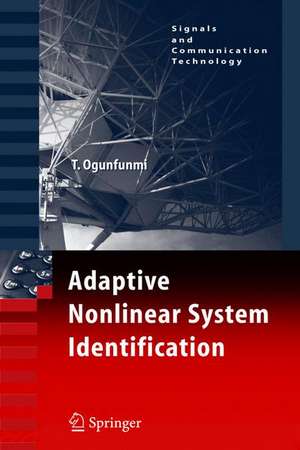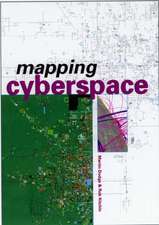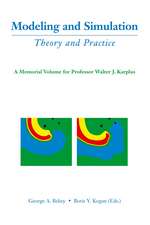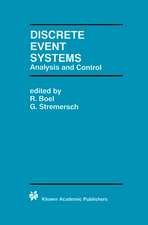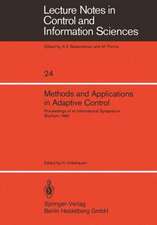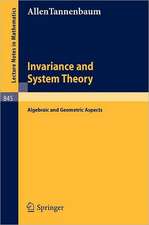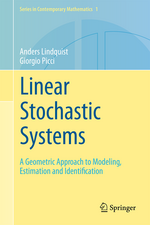Adaptive Nonlinear System Identification: The Volterra and Wiener Model Approaches: Signals and Communication Technology
Autor Tokunbo Ogunfunmien Limba Engleză Hardback – 12 sep 2007
After a brief introduction to nonlinear systems and to adaptive system identification, the author presents the discrete Volterra model approach. This is followed by an explanation of the Wiener model approach. Adaptive algorithms using both models are developed. The performance of the two methods are then compared to determine which model performs better for system identification applications.
Adaptive Nonlinear System Identification: The Volterra and Wiener Model Approaches is useful to graduates students, engineers and researchers in the areas of nonlinear systems, control, biomedical systems and in adaptive signal processing.
| Toate formatele și edițiile | Preț | Express |
|---|---|---|
| Paperback (1) | 637.46 lei 6-8 săpt. | |
| Springer Us – 23 noi 2010 | 637.46 lei 6-8 săpt. | |
| Hardback (1) | 637.28 lei 6-8 săpt. | |
| Springer Us – 12 sep 2007 | 637.28 lei 6-8 săpt. |
Din seria Signals and Communication Technology
- 18%
 Preț: 952.89 lei
Preț: 952.89 lei - 18%
 Preț: 1559.80 lei
Preț: 1559.80 lei - 17%
 Preț: 361.80 lei
Preț: 361.80 lei - 18%
 Preț: 811.61 lei
Preț: 811.61 lei - 15%
 Preț: 585.26 lei
Preț: 585.26 lei - 18%
 Preț: 727.97 lei
Preț: 727.97 lei - 15%
 Preț: 585.90 lei
Preț: 585.90 lei -
 Preț: 393.35 lei
Preț: 393.35 lei - 20%
 Preț: 1002.73 lei
Preț: 1002.73 lei - 15%
 Preț: 641.71 lei
Preț: 641.71 lei - 20%
 Preț: 338.92 lei
Preț: 338.92 lei - 18%
 Preț: 1579.66 lei
Preț: 1579.66 lei - 18%
 Preț: 896.08 lei
Preț: 896.08 lei - 18%
 Preț: 847.11 lei
Preț: 847.11 lei - 18%
 Preț: 1234.77 lei
Preț: 1234.77 lei - 18%
 Preț: 905.54 lei
Preț: 905.54 lei - 15%
 Preț: 646.43 lei
Preț: 646.43 lei - 20%
 Preț: 662.48 lei
Preț: 662.48 lei - 15%
 Preț: 641.20 lei
Preț: 641.20 lei - 18%
 Preț: 1847.84 lei
Preț: 1847.84 lei - 18%
 Preț: 946.24 lei
Preț: 946.24 lei - 18%
 Preț: 1241.10 lei
Preț: 1241.10 lei - 20%
 Preț: 649.43 lei
Preț: 649.43 lei - 20%
 Preț: 993.28 lei
Preț: 993.28 lei - 18%
 Preț: 940.57 lei
Preț: 940.57 lei - 18%
 Preț: 1389.30 lei
Preț: 1389.30 lei - 20%
 Preț: 1003.50 lei
Preț: 1003.50 lei - 18%
 Preț: 953.52 lei
Preț: 953.52 lei - 20%
 Preț: 1001.16 lei
Preț: 1001.16 lei - 18%
 Preț: 1415.36 lei
Preț: 1415.36 lei - 15%
 Preț: 653.33 lei
Preț: 653.33 lei - 15%
 Preț: 645.60 lei
Preț: 645.60 lei - 18%
 Preț: 948.79 lei
Preț: 948.79 lei - 18%
 Preț: 945.62 lei
Preț: 945.62 lei - 18%
 Preț: 836.36 lei
Preț: 836.36 lei - 18%
 Preț: 1225.46 lei
Preț: 1225.46 lei - 15%
 Preț: 635.01 lei
Preț: 635.01 lei - 15%
 Preț: 639.25 lei
Preț: 639.25 lei - 15%
 Preț: 646.30 lei
Preț: 646.30 lei - 15%
 Preț: 639.25 lei
Preț: 639.25 lei - 15%
 Preț: 712.36 lei
Preț: 712.36 lei - 20%
 Preț: 1006.12 lei
Preț: 1006.12 lei - 18%
 Preț: 970.56 lei
Preț: 970.56 lei
Preț: 637.28 lei
Preț vechi: 749.73 lei
-15% Nou
Puncte Express: 956
Preț estimativ în valută:
121.96€ • 126.86$ • 100.68£
121.96€ • 126.86$ • 100.68£
Carte tipărită la comandă
Livrare economică 14-28 aprilie
Preluare comenzi: 021 569.72.76
Specificații
ISBN-13: 9780387263281
ISBN-10: 0387263284
Pagini: 229
Ilustrații: XVI, 232 p.
Dimensiuni: 155 x 235 x 22 mm
Greutate: 0.33 kg
Ediția:2007
Editura: Springer Us
Colecția Springer
Seria Signals and Communication Technology
Locul publicării:New York, NY, United States
ISBN-10: 0387263284
Pagini: 229
Ilustrații: XVI, 232 p.
Dimensiuni: 155 x 235 x 22 mm
Greutate: 0.33 kg
Ediția:2007
Editura: Springer Us
Colecția Springer
Seria Signals and Communication Technology
Locul publicării:New York, NY, United States
Public țintă
ResearchCuprins
to Nonlinear Systems.- Polynomial Models of Nonlinear Systems.- Volterra and Wiener Nonlinear Models.- Nonlinear System Identification Methods.- to Adaptive Signal Processing.- Nonlinear Adaptive System Identification Based on Volterra Models.- Nonlinear Adaptive System Identification Based on Wiener Models (Part 1).- Nonlinear Adaptive System Identification Based on Wiener Models (Part 2).- Nonlinear Adaptive System Identification Based on Wiener Models (Part 3).- Nonlinear Adaptive System Identification Based on Wiener Models (Part 4).- Conclusions, Recent Results, and New Directions.
Recenzii
From the reviews:
"In this book, the author presents simple, concise, easy-to-understand methods for identifying nonlinear systems using adaptive filter algorithms well known for linear systems identification. The book focuses on the Volterra and Wiener models for nonlinear systems … . It is another contribution to the current literature on the subject. The book will be useful for graduate students, engineers and researchers in the area of the nonlinear systems identification and adaptive signal processing." (George S. Stavrakakis, Zentralblatt MATH, Vol. 1130 (8), 2008)
"In this book, the author presents simple, concise, easy-to-understand methods for identifying nonlinear systems using adaptive filter algorithms well known for linear systems identification. The book focuses on the Volterra and Wiener models for nonlinear systems … . It is another contribution to the current literature on the subject. The book will be useful for graduate students, engineers and researchers in the area of the nonlinear systems identification and adaptive signal processing." (George S. Stavrakakis, Zentralblatt MATH, Vol. 1130 (8), 2008)
Textul de pe ultima copertă
Adaptive Nonlinear System Identification: The Volterra and Wiener Model Approaches introduces engineers and researchers to the field of nonlinear adaptive system identification. The book includes recent research results in the area of adaptive nonlinear system identification and presents simple, concise, easy-to-understand methods for identifying nonlinear systems. These methods use adaptive filter algorithms that are well known for linear systems identification. They are applicable for nonlinear systems that can be efficiently modeled by polynomials.
After a brief introduction to nonlinear systems and to adaptive system identification, the author presents the discrete Volterra model approach. This is followed by an explanation of the Wiener model approach. Adaptive algorithms using both models are developed. The performance of the two methods are then compared to determine which model performs better for system identification applications.
Adaptive Nonlinear System Identification: The Volterra and Wiener Model Approaches is useful to graduates students, engineers and researchers in the areas of nonlinear systems, control, biomedical systems and in adaptive signal processing.
After a brief introduction to nonlinear systems and to adaptive system identification, the author presents the discrete Volterra model approach. This is followed by an explanation of the Wiener model approach. Adaptive algorithms using both models are developed. The performance of the two methods are then compared to determine which model performs better for system identification applications.
Adaptive Nonlinear System Identification: The Volterra and Wiener Model Approaches is useful to graduates students, engineers and researchers in the areas of nonlinear systems, control, biomedical systems and in adaptive signal processing.
Caracteristici
The focus is on the Volterra and Wiener modeling approaches, which have become very popular in signal processing circles
